So, where
did all of this silliness begin?
Was it
Peter Swales’s fault?
It always used to be, back in the old days
when City were a solid laughing stock and almost everyone loved them for it.
"You did what?! You sold Asa Hartford, Brian Kidd, Dennis Tueart, Peter Barnes, Dave
Watson and Gary Owen and replaced them with Dave Wiffill and Paul Sugrue.
Michael Robinson and Bobby Shinton. Have you gone out of your tiny mind?"
We still had Lee, of course, but it was
Stuart not Francis and in any case the noise from everyone laughing wouldn’t
let you appreciate his quietly ineffective outings up the right flank anyway..
And so it
came to pass that Swales, in his ever-more desperate urge to catch Manchester
United, who would each summer scoop up the close season’s most expensive
purchase (be it Bryan Robson for nearly two million, Paul Ince in a controversial
move from West Ham, where he had the red shirt on so quickly he was officially
still a Hammers player when he fronted the press photographers, Gary Pallister for today’s equivalent of £50m or the expensive crab-like movements of Ray
Wilkins), kept on upping the ante.
Just as in the world of politics, people have developed short memories. Either that or they weren’t born in those heady days of parkas and black and white tellies. Or maybe they wisely choose not to do
the research. Liverpool in the 70s and United in the 80s and 90s, dominated the
transfer market completely, cherry picking whoever they wanted. The fees paid
pushed the market ever upwards and produced in the likes of Swales, Freddy Shepherd at Newcastle and Doug Ellis at Villa a paranoid
need to try and tag along.
City were a
busted flush, broke and laughable, going through the motions one last time with
Trevor Francis, nicked from the grasp of – you guessed it – United in a last
bid to wrest control in 1981. As any finance expert or inhabitant of the Emirates
forecourt will tell you, however, false economies and overstretched budgets don’t
work unless you have a solid Plan B.
When
Francis’s well-publicised proneness to injury resurfaced, City were sunk. Gary
Buckley and Aage Hariede were hardly like-for-like replacement. Without Francis, City
looked utterly threadbare and were banished to the second division with a team
shorn of its great stars and manned instead by the likes of Ian Davies, Chris
Jones and a 39-year old John Ryan. They had been 2nd in November after a 2-0
win over Southampton at Maine Road and now here they were, descending into the
relegation places for the first time that season on the very last day of the
campaign, dumped there by Raddy Antic’s 84th minute winner for Luton
Town.
Even that had been done adhering to the great Manchester City Book of Comedy. Eddie Large on the bench, David Pleat in his fawn suit and slip-ons, Luton Town singing on Match of the Day while wearing straw hats, we had the lot. Those trying to overturn the nº 41 on Clarement Road afterwards, however, had not stayed for the punchline.
Our chips and gravy had gone sour.
The
following years brought meagre signings with new boss Billy McNeil’s hands tied
behind his back. Miraculously, City resurfaced in the top flight within two
years with Jim Tolmie, Derek Parlane, Neil McNab, Gordon Dalziel, Graeme Sinclair
and Duncan Davidson the next-to-nothing signings that carried the ship forward, unsteady step by unsteady step.
City
returned south two seasons later and began an even bigger descent in the
mid-90s that took the club to the edge of oblivion, otherwise known as the Moss
Rose, Macclesfield. League games against Bury, Stockport, Lincoln, York and
Wrexham represented the coldest of showers for the great unwashed of the old
Kippax terraces.
Broke and
disheartened, we could only watch from afar as United and Liverpool continued
their decades-long splurges, joined by a new moneyed elite of Arsenal (organic)
Chelsea, buoyed first by Mathew Harding’s largesse then the windfall of Roman
Abramovic’s surprise oil and steel windfall. Even Leeds were up there with the
big hitters, spending money their erudite chairman Peter Ridsdale didn’t even know they had (they didn’t
have it, as it turned out).
The Premier League’s dawn had occurred with City present at the 1992 curtain raisers, but soon the bandwagon laden with money was heading off over the horizon like a cartoon charabanc with City tied to a tree in dead man’s gulch.
David Bernstein,
the first man at Maine Road, who could do O level arithmetic, steadied the ship in the third tier.
Still City’s signings (Danny Allsopp, Danny Tiatto) were distinctly Argos to
United’s Rue St Honoré purchases of Matt Stam, Jesper Blomquist and – just to
show they still held onto a vague sense of humour – Karel Poborsky.
 |
| Standing room only at Macclesfield |
City
crawled back, carried by a wave of gritty enthusiasm from the terraces. Those “invisible” fans that
turned up in ever-increasing numbers the worse things got carried the club
forward. Astute buys and growing momentum sent the club back in the right
direction. By the time City found themselves consolidating under the arclights
of the Premier League again, foreign investors were beginning to hover, rightly seeing the club as one of English football's great investment opportunities.
Thaksin
Shinawatra, deposed dictator of Thailand with an ill-gotten penny or two to
stash away, took over from John Wardle and David Makin, whose financial backing
in the lean years had been crucial to City’s survival. Still loved by many fans
for their authentic otherworldlyness, City had ramped up their devil-may-care
image with Kevin Keegan, bringing all out attack and a return to boom and bust
transfers to the club. Robbie Fowler’s switch in particular nearly brought the
house down again, Keegan insisting on “one more sweetie before dinner”. The
irony of taking on a rotund Fowler from Leeds, at this point imploding under
the pressure of Ridsdale’s unusual accounting (he had the most expensive goldfish in English football, which - unlike Leeds - could swim), was eye-watering. Shinawatra’s
entrance bolstered coffers about to pop open once again, but all was not well.
An 8-1
defeat at Middlesbrough topped a previous last day of the season game with the
same opponents, when UEFA Cup football was missed by the width of a post, red
faced Fowler missing the injury time penalty that would have put City into
Europe. With manager Stuart Pearce employing David James up front, City were
once again everyone’s favourite laughing stock: harmless, feather-light on the brain
and unerringly impotent, they were present day Newcastle and Leeds rolled into
one, fluffy, desperate ball of lightly powdered intrigue.
In the 90s,
as the club ricocheted from one disaster to another, the idea of the 5th
Column surfaced. There had always been boardroom insiders, members of the press, moles and
snipers, all trying to disable the club’s attempts at walking in a straight
line. For the most part, City hadn’t required any help, but they were there,
dark and shadowy figures lurking in the corridors if push came to shove.
As
Shinawatra’s wobbly morals came under the spotlight, the club once again reached
a turning point. Premier League mobility required great amounts of money and
the Thai was spending more and more of his to keep himself out of jail. Then
suddenly a seismic shift that is still wobbling the league like a jelly nearly
a decade later.
September 1st
2008.
Never look
back. Lightning had struck in Manchester and we were all a little singed.
Transfer
deadline day was hijacked by City, as they were first bought outright by the
hitherto unheard of Sheikh Mansour from Abu Dhabi, then joined the fun and games of the last four hours of deadline
day to turn it into a soap opera of the highest calibre. Pushing United beyond
£30 million for Dimitar Berbatov was the first bit of jiggery pokery. City then hijacked Robinho’s move to Chelsea
from Real Madrid, morphing from high end slapstick to shoot-to-kill in
the space needed for a gentle period of tiffin.
Welcomed at
first at the top table, City’s attempts to buy impressively had involved The Jo
Experiment and other trips into surreal places with Emanuel Adebayor and unofficial
club mascot Glauber Berti. City were in the club but they were on the outside
still, with their wonky cheque book and their over-polished shoes.
The public
reaction was mainly glee that a proper club could make it rich, that a daft
club could maybe try to upset the applecart, that the Champions League cartel of
United, Liverpool, Arsenal and Chelsea, the perennial qualifiers, might just
have a fly dropped in their ointment at some stage in the future.
The
problems really started when City started to beat United. With Alex “not in my lifetime”
Ferguson still in charge, these so-called noisy neighbours and classless oiks started to
get the better of his megalith United. Gently at first, then cataclysmically
with an FA Cup semi final win, then a 6-1 win at Old Trafford that nearly
reduced him to retirement on the spot and the crushing 1-0 win to turn the
title race into a two-horse race. That United had come to the Etihad to defend
said it all. The lame ponies had turned into galloping stallions and United
were getting trampled underfoot. Up front, City's riches had enabled the purchase of Carlos Tevez from United too, a painful reminder despite the Argentinean's obvious penchant for trouble, that the tables had been turned.
Which is
where the 5th column re-emerges. The mainstream press, brought up on
the need to satiate United’s millions of followers with anodine puff pieces
about their heroes, had a major issue on their hands. City were grabbing all
the back page space for themselves and it was not because they were bankrupt,
relegated or knocked out of the cup by a soothsayer. Now it was serious.
At some
point between City’s earth shattering first Premier League win, at United’s
expense of course, and their second two years later under the less voluble Manuel Pellegrini, something changed. Good will towards the new elite
ebbed away to be replaced by a casual hatred for their vulgar spending sprees.
The press looked for any angle that could paint a negative picture. < 2002: Rio Ferdinand is unveiled at United for a record fee of £28m (rising to £33m), breaking the British record transfer fee for the third time in 13 months after the arrivals of Ruud van Nistelrooy and Juan Sebastian Veron. The press reported it calmly and objectively.
And they're right. It is all a little nauseous. It is a little vulgar. It is a little astonishing. But it has always been a little like this. As the Premier League cash cow has gradually grown its great swinging, vein-flecked udders, we have all been splashed with milk. However hard we try to make City's ventures worse than anyone else's, however, Everton spraying £25m all over Burnley for Michael Keane, Chelsea leaking £40m for Bakayoko and Manchester United testing the boundaries of decency with £31m for Lindelöf and a king's ransom for Lukaku are all just as "bad", if it is indeed possible or useful to try and compare these things. Certainly it is City that are stirring the emotions right now and stirring them vigorously. That Lukaku's monster fee produced mainly glee and excitement from the press was predicable. That City's desperate swoop for a full back needs Mirror stalwarts David Anderson AND David O'Donnell to co-write a piece humping the price up to over double its actual worth just serves to underline how far City's star has fallen. Infamy, infamy, they've all got it infamy, as Frankie Howerd might have said.
From those
timid days of Paul Sugrue, of the virgin Bobby Shinton and Peter Swales purchasing Kazimierz Deyna from Legia Warsaw with a trailer full of fridge
freezers from Altrincham, from Romark tipping Big Mal’s City out of the FA Cup ona quagmire in Halifax, from Nick Fenton belting the ball onto the roof v Notts County and Jamie Pollock morphing into Ronaldinho just to score the best own goal in history, City have emerged into the dazzling white light at
the top of the football mountain.
But even here they have found darkness.


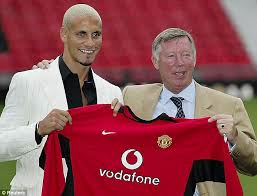





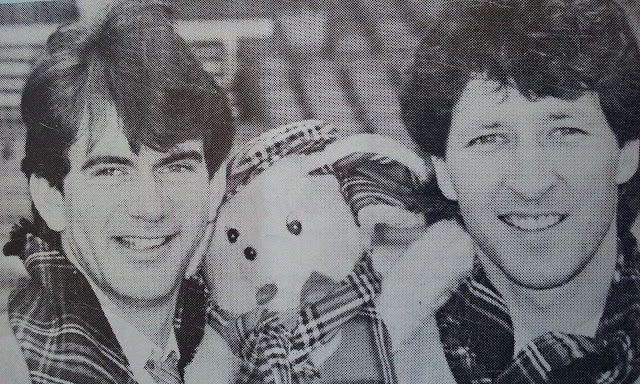

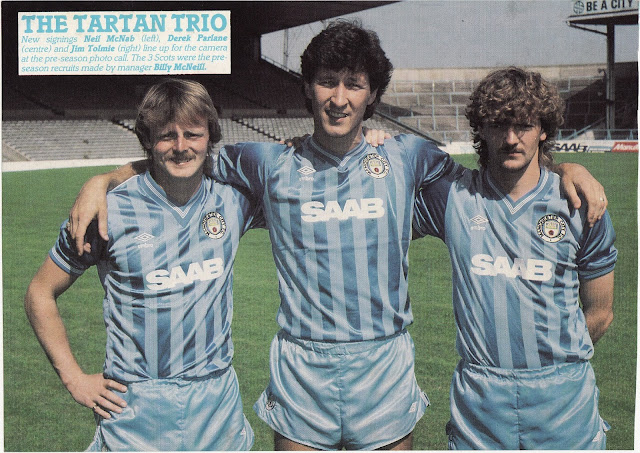



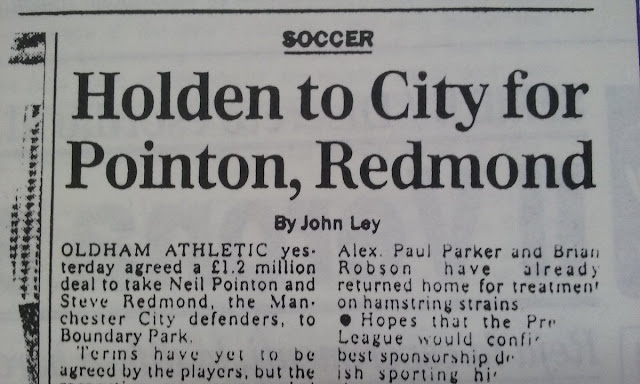












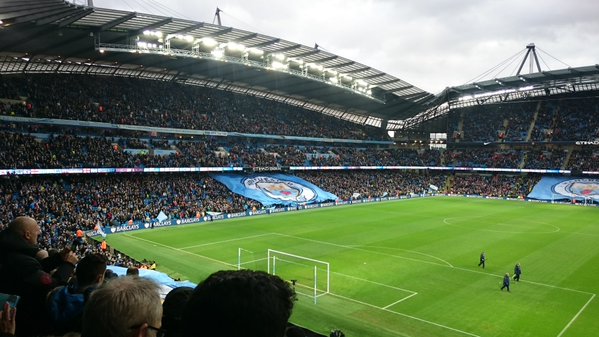

.jpg)

